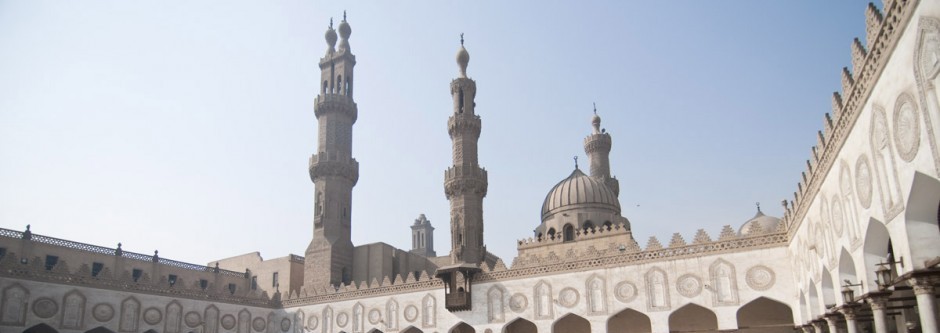Al Azhar University: The Strong Third Force in Egypt
With the Muslim Brotherhood’s Mohamed Morsi elected president of Egypt, many people are asking what this says about how average Egyptians see the role of religion in public life. The United States especially is watching Egypt with interest right now because of the historically strong relationship between the two countries.
But to understand religion’s role in Egypt, it is crucial to understand that Egypt contains powerful non-partisan religious voices that preclude religious scholars siding with Islamic parties, as occurred in Iran. No doubt, Egypt is still a profoundly religious culture and it is generally socially unacceptable to oppose religion. If Jeffersonian-style democracy – the notion that believers should leave religion at home when publically discussing political questions – is impossible in the Egyptian context, the question is not whether or not religion will manifest itself in the public square, but how.
For Muslim Egyptians, the majority of the population, there are three forces that influence how religion is seen in public life: the Muslim Brotherhood, which supports a civil state but has a highly politicised understanding of Islam; Salafi political parties, such as the Al Nour or Al Asala parties, which emphasise a vision of Islam based on Wahhabi ideology, which is not indigenous to Egypt, and call for the application of Saudi-style laws; and Al-Azhar University, the most prestigious Islamic university in the Arab region and the oldest still-functioning university in the world (founded in 971 in Cairo). Al-Azhar focuses on Islam’s relationship to contemporary political and social issues, but through a different lens, drawing on Islamic intellectual heritage.
While many analysts have understandably examined the Muslim Brotherhood and Salafi political parties as forces that can shape the Egyptian public’s views on the role of religion in politics in post-revolutionary Egypt, they have completely missed the critical role of Al-Azhar.
Overlooking Al-Azhar would be a mistake given its thousand-plus year history, unique experience and methodology, renowned research council and sheer number of graduates. While the Muslim Brotherhood has about 600,000 members, Al-Azhar educational institutions currently have two million students (500,000 at the university level and 1.5 million in primary and secondary schools). Moreover, Al-Azhar University graduates are imams or preachers in 110,000 mosques – approximately 80 per cent of the total in Egypt – and the university has 10 million alumni.
The majority of Egyptian Muslims look to the scholars of Al-Azhar University for both spiritual and intellectual guidance, not the Muslim Brotherhood or Salafi groups.
Al-Azhar University’s approach is much more measured and scholarly. Its method is to seek the common good and eschew partisan politics. Because of its deep history, the extent of its influence and its approach, it is crucial to the current political landscape of Egypt and facilitating the smooth transition that is vital to the country’s future.
The religious scholars of Al-Azhar (the ulama) have, in fact, long held the position of intermediaries between the people and the government, often acting as the social conscience of Egypt and custodians of popular sentiment and tradition. Al-Azhar announced at the beginning of this election cycle that it would not institutionally endorse any candidate, since its purpose is to work with all groups to seek the common good.
Most recently, for example, Al-Azhar issued guidelines for the new constitution guaranteeing full citizenship before the law to all members of Egyptian society regardless of religion, race or creed, and challenged questionable campaign practices of Islamic parties, such as asking imams to promote specific parties. The parties publicly changed their campaign practices, acquiescing to Al-Azhar’s authority, even if some of these practices continued less publicly.
The cultivation and strengthening of democratic values requires a legitimacy that is not on offer from any quarter but those who have continuously played this historic role in Egyptian society, that is, the Azhari ulama.
It is thus vital to long-term US interests in Egypt and the Middle East North Africa region not only to become more aware of but also to work with institutions like Al-Azhar. This relationship could take many forms, such as scholarships for top Al-Azhar graduates, who represent future religious and intellectual leaders of the Arab world, to leading universities in the United States; cooperation on research and translation of seminal Western and Islamic texts; and ultimately opening a branch of Al-Azhar University within the United States itself.
If the destinies of Islamic civilization and the West are intertwined, it is working with mainstream Muslim institutions like Al-Azhar that holds the greatest promise for achieving mutual understanding and global cooperation.
Waleed El-Ansary is Helal, Hisham and Laila Edris El-Swedey University Chair in Islamic Studies at Xavier University in Cincinnati, Ohio.




You must be logged in to post a comment Login